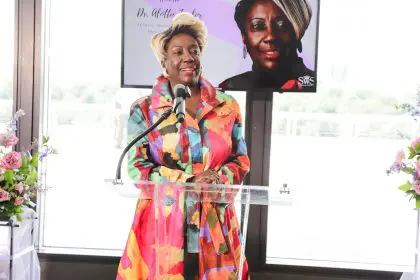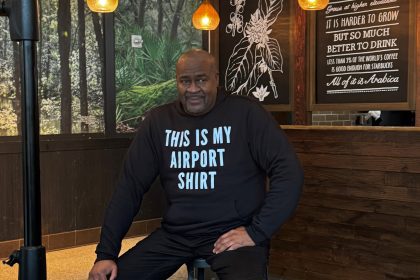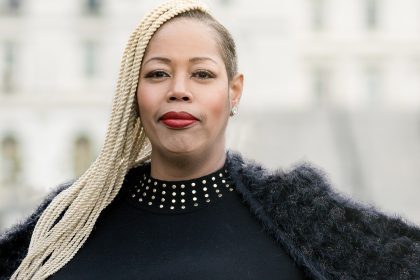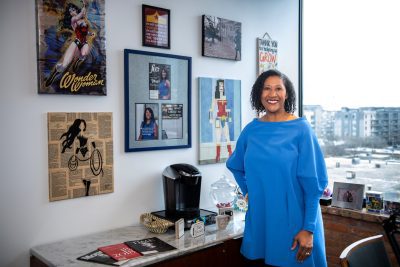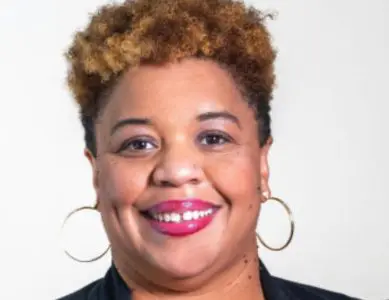
Denise Forte doesn’t just talk about educational equity – she engineers it. As President and CEO of EdTrust, Forte has become a pivotal force in reforming America’s educational landscape by leveraging a surprisingly straightforward superpower: relationship building.
Named one of the Washingtonian’s 500 Most Influential People two years running, Forte combines analytical precision (honed through her computer science degree from Duke) with deep social consciousness (reflected in her Women’s Studies master’s from George Washington University). Her two decades in congressional staff roles and service in the Obama administration’s Department of Education have positioned her as one of today’s most effective advocates for students of color and those from low-income backgrounds.
As a CEO, what do you do in your downtime to stay sharp?
I’d have to ask my team that—how do I stay sharp?
I am very fortunate to have a wonderful partner in crime—my husband, who’s a schoolteacher—and I have two amazing boys that keep me quite busy. So that makes up my downtime.
But I also live in probably the most beautiful and exciting and culturally relevant city—the District of Columbia. There are a lot of things that I can do to keep myself sharp, to keep myself fresh, and to keep myself active. I’m so glad that I live here.
Who are three of your female heroes that had superpowers in this society that you admire?
First and foremost—if you folks are not following Fatima Goss Graves of the National Women’s Law Center, you are already behind the times. She is an amazing, young, insightful, provocative Black woman who I’m lucky to call a friend—Fatima Goss Graves at the National Women’s Law Center.
I would also consider Aaliyah Samuel, who is the CEO of CASEL.
CASEL supports a lot of social-emotional learning. And as we say at Ed Trust: all learning is social-emotional learning. All academic learning is social-emotional learning. I would definitely check out Aaliyah Samuels—another amazing Black woman leading a really important organization supporting young people these days.
And lastly, let me go back in time a little bit, if you’ll allow me. But we can’t forget those women who said, “I’m bringing a chair to the table”—Shirley Chisholm, who also really made sure that her voice was heard, that she was courageous at all moments, and just was a groundbreaker in so many ways in the policy and political community.
So those three come to the top of mind, but I’m sure I have a longer list that I’d share with you.
What is your superpower?
Oh, my superpower! Oh my gosh, I love that question.
The thing that I think has made me successful in what I do now—and what I’ve done in the past, where I was on Capitol Hill for more than 20 years—is I deeply believe in the power of relationships.
It’s important to get to know people, to understand where they’re coming from, what their values are, and how I might be able to share with them or partner with them in making those values really become true.
I think that’s really, really important in the policy context. You have to share and believe in what you believe the policy outcome should be—maybe all kids reading at 3rd grade. We might differ on how you get there, but as long as you believe in the policy outcome, you’re usually going to get the right policy outcome.
But again, the only way you can do that is to really invest in the relationship in the beginning. And that’s what I think has been my superpower.
Final thoughts
In a field often dominated by metrics and test scores, Forte’s emphasis on relationship building offers a refreshing counterpoint. Her approach—understanding people’s values before attempting to change systems—has proven remarkably effective in Washington’s often divided policy landscape.
By highlighting women leaders who inspire her, from Fatima Goss Graves and Aaliyah Samuel to trailblazer Shirley Chisholm, Forte demonstrates how influential women create networks of support and inspiration. Her recognition that meaningful change happens through connection rather than confrontation provides a valuable lesson for leaders in any field.
As Forte continues her work transforming educational opportunities, her superpower of relationship building remains her most powerful tool for creating lasting, meaningful change.

